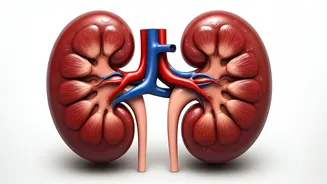Kidneys: Vital Organs
Kidneys are crucial for filtering waste and excess fluids from the blood, maintaining a healthy balance in the body. They perform numerous essential functions,
including regulating blood pressure, producing hormones, and activating vitamin D, which is vital for bone health. Healthy kidneys ensure the efficient removal of waste products, such as urea and creatinine, keeping the blood clean and functioning correctly. This filtering process prevents the build-up of toxins that can harm the body. These bean-shaped organs, located on either side of your spine, are always working to keep your body in balance. Proper hydration is a key element in supporting their function.
Water's Role Explained
Water is the primary component of blood and is essential for kidney function. It helps kidneys filter waste products from the blood, allowing them to perform their cleaning function effectively. Adequate hydration ensures that these waste products, including urea and creatinine, are easily flushed out of the body. Furthermore, water helps to prevent the formation of kidney stones by diluting the urine. When urine is concentrated, minerals can crystallize, leading to the formation of painful kidney stones. By drinking enough water, you reduce the concentration of these minerals, decreasing the risk of stone formation. The kidneys also use water to regulate blood pressure and the body's electrolyte balance, contributing to overall health.
Dehydration's Harmful Effects
Dehydration puts significant stress on the kidneys. When the body lacks sufficient water, the kidneys struggle to perform their filtering tasks. This strain can lead to a buildup of waste products in the blood, potentially causing kidney damage over time. Dehydration also reduces blood flow to the kidneys, which can impair their function. Moreover, it increases the risk of kidney stone formation, as the urine becomes more concentrated. Symptoms of dehydration can include dark-colored urine, decreased urination, fatigue, and dizziness. Chronic dehydration can increase the risk of chronic kidney disease and other kidney-related issues, making it crucial to stay well-hydrated to support kidney health. Early detection and treatment are vital in mitigating these risks.
Daily Water Intake Tips
The recommended daily water intake varies based on factors such as activity level, climate, and overall health. A general guideline is to drink around eight glasses of water per day, but this can be adjusted based on individual needs. You can monitor your hydration levels by observing the color of your urine; light yellow urine usually indicates adequate hydration. Carry a reusable water bottle and refill it throughout the day to ensure you always have access to water. Set reminders on your phone or computer to drink water regularly, especially if you have a busy schedule. Consider drinking water before, during, and after meals, and incorporate hydrating foods like fruits and vegetables into your diet. These easy habits can make a significant difference in maintaining optimal kidney function and overall well-being.
Beyond Plain Water
While plain water is the best choice, various other beverages can contribute to your daily fluid intake. Herbal teas, especially those without caffeine, are a great option for hydration. Infusing water with fruits like lemon, cucumber, or berries adds flavor and encourages more consumption. Avoid excessive intake of sugary drinks and artificial sweeteners, as these can contribute to health problems. Additionally, consuming water-rich foods such as watermelon, cucumber, and spinach can also boost your hydration levels. By diversifying your fluid sources and making smart choices, you can enhance your hydration habits and support kidney health effectively. Moderation and mindful consumption of various beverages can make staying hydrated more enjoyable and beneficial.
Signs of Kidney Issues
Being aware of potential signs of kidney problems can help with early detection and treatment. Swelling in the ankles, feet, or hands might indicate that your kidneys aren't properly removing fluids. Changes in urination, such as increased frequency, difficulty, or pain, can also be red flags. Other symptoms can include fatigue, loss of appetite, and changes in the color or odor of your urine. If you experience any of these symptoms, it's essential to consult a healthcare professional for diagnosis and guidance. Regular health check-ups and kidney function tests can also help detect early signs of kidney issues. Early intervention is crucial to prevent chronic kidney disease progression and protect your overall health.













